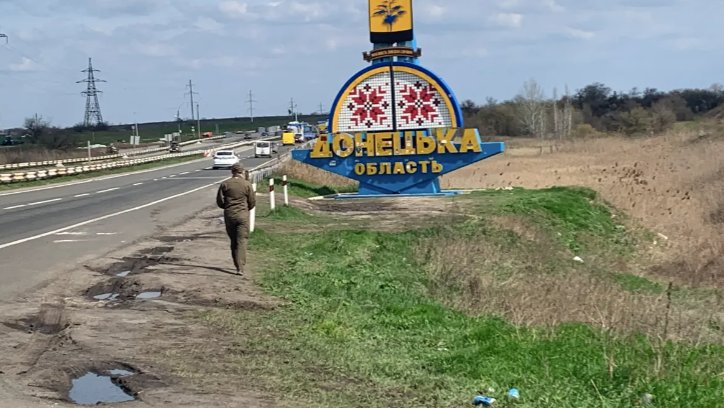A concrete blockhouse known as a pillbox has grown up from the ground on the edge of a small park. Locals have gotten used to the grey hemisphere and no longer pay any attention. The pillbox is meant to serve as a shelter for civilians in case shelling happens whilst they are outside. It can hold about ten people.
There are numerous pillboxes in Pokrovsk. Over fifty thousand people lived here before the 2022 invasion. After February 2022, people left en masse, hoping that “all this” would soon end somehow.
Since the summer, the process has reversed itself. Over half of the inhabitants have returned: “We wandered around, spent all our savings, [and decided it was] enough.”
There are many cars in the streets. Shopping centres are open — but everything is “terribly expensive”. So are coffee shops, but “no one goes [to them]”. In the courtyards, people paint playgrounds and dig up flower beds, because “there is no work. The humanitarian aid is not for everyone; the best stuff gets stolen and sold, and that’s how people become millionaires around here”.
The Pokrovske coal mine, which had been taken over by oligarch Rinat Akhmetov’s Metinvest group a year before the invasion, has posted vacancies. The list begins with mining jobs for 25-35 thousand hryvnias a month (about 600–840 euros).
No one wants to imagine what will happen if the front line comes close to Pokrovsk and the bunkers have to be used for their intended purpose.
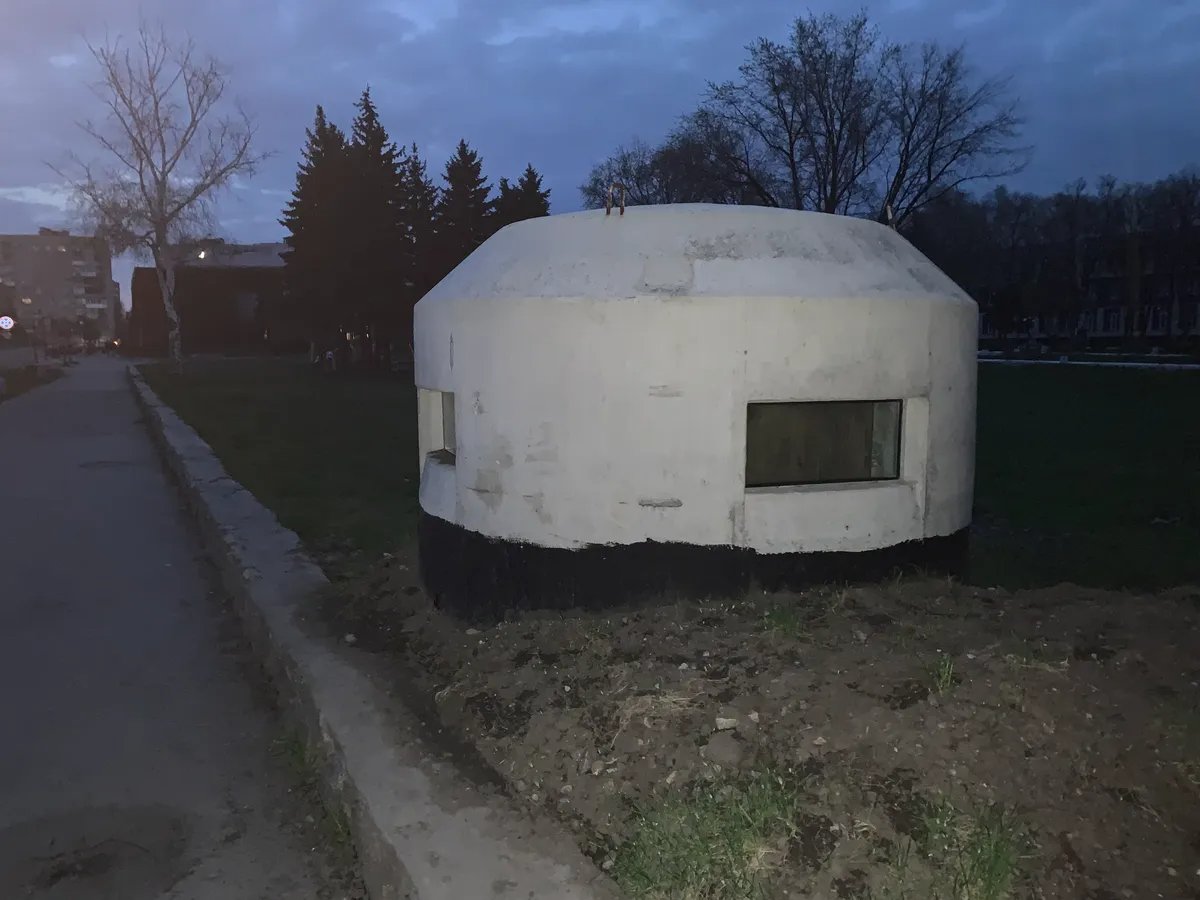
This is what the pillboxes look like. They can be used as shelter if shelling begins while people are on the street. Photo: Olga Musafirova
The children question
“In other times, I wouldn’t have let you into the delivery room at all. And now I’m inviting you myself,” says Ivan Ivanovich Tsyganok, leading us quickly through a labyrinth of corridors to a corner where a canopy of so-called “soft glass” has been erected. Here, they admit women in labour who have COVID (or are suspected to). So far no one’s actually had the virus. But after I leave, everything will be disinfected again. Hearing us, a startled nurse runs out. Ivan calms her down: “No, it’s okay, it’s a journalist from Kyiv!”
Tsyganok is the Chief Doctor of the Pokrovsk perinatal centre. He’s a top-notch OBGYN and has been working in the field for 30 years. The centre is the only one in the Donetsk region; the one in Mariupol was destroyed by bombs, and the one in Kramatorsk closed. The perinatal centre is different from an ordinary maternity hospital, because it deals with especially severe and critical cases. Forty kilometres away from here, in Avdiivka, heavy fighting continues.
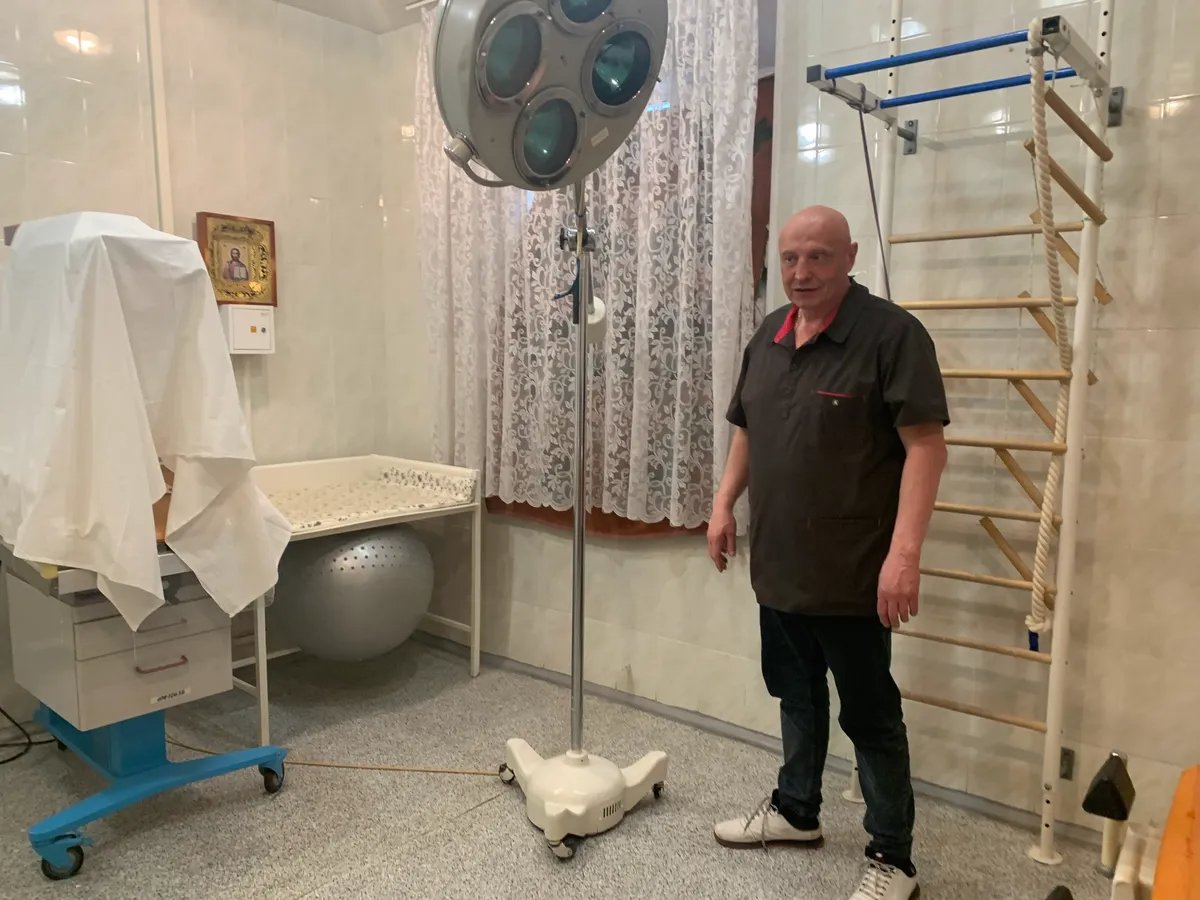
Ivan Tsyganok, chief doctor of the perinatal centre, shows the delivery room. Photo: Olga Musafirova
Tsyganok and his colleagues show me a room where a window is blocked by a pile of sandbags; a tulle curtain is draped over them “for aesthetics”. A rack of equipment has been covered with a sheet. A big grey exercise ball is meant to help women in labour relax between contractions. The Swedish ladder wall bars perform the same function. I notice an icon on the switchboard above the table. The head doctor follows my gaze:
“Yes, when there is bombing, we hope God will save us. So far, he has.”
Not everyone in the region has been so lucky. On the morning of 15 February, a Russian missile struck a residential five-storey building seven hundred metres away, destroying the entrance. Three dead, eleven wounded. Several neighbouring houses and a school were damaged. The centre, too, was shaken by the reverberation of the blast. And filled with the sound of women screaming… Almost every birth here is premature — often caused by stress — and high-risk. But those who got out of Bakhmut and Avdiivka will not be comforted by a fitball — nor will they even find space on an outgoing train at the local station (Pokrovsk has become the evacuation transport hub of the region). It is too late.
“If there’s heavy shelling and we have to deliver a baby or perform surgery, we move over here. We observe the rule of two walls.” Tsyganok opens the door to a windowless room; in the corner stands a gynaecological chair with wheels and cheerful pink cushions. “Lyubov Anatolievna!” (Waving to a young woman who makes an attempt to avoid attention) “Doctor, come here, you have to give an interview!”
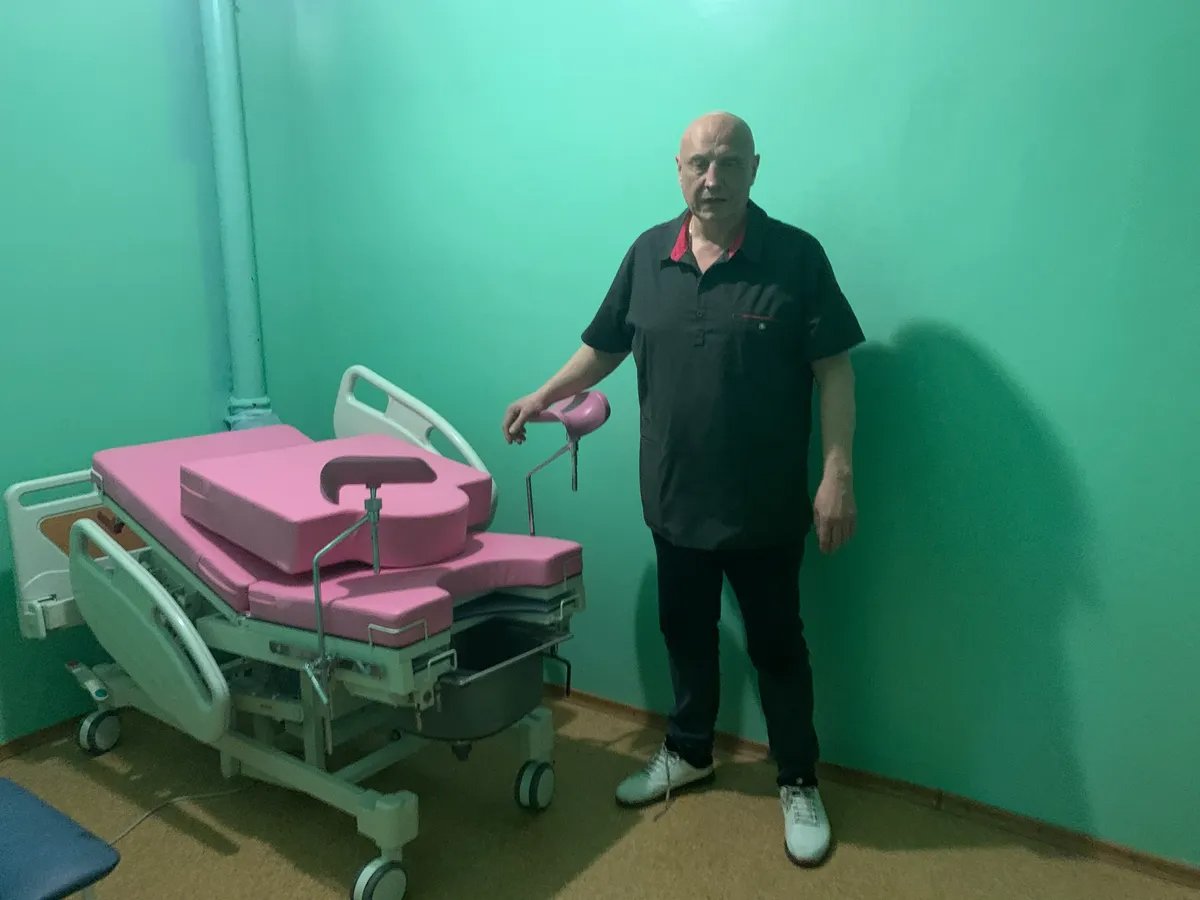
The hospital staff move deliveries to this corner room during bombings, observing the rule of two walls. Photo: Olga Musafirova
He adds significantly: “People have brought humanitarian aid. Orthopaedic mattresses, infusion pumps, nappies and more.” (I myself came to Pokrovsk with one of these humanitarian aid groups, the charity foundation Centre of Resistance to Occupation.)
The words “mattresses” and “pumps” make Lyubov Anatolievna perk up, forgetting her former opposition to the interview.
“Lyubov Anatolievna is a neonatologist, temporarily relocated from Avdiivka. Her house there is practically gone,” Tsyganok says, introducing his colleague.
“No one there has a house anymore,” she clarifies.
“There are three of us,” continues Tsyganok. “There used to be 26 doctors at the maternity hospital. Now I and a specialist from the gynaecology department help Lyubov Anatolievna. And there are two more people in the maternity clinic. There are twenty-five round-the-clock shifts a month, including the urgent ones.”
“Did the rest quit?” I ask.
There is a pause.
“There are five babies in intensive care. There is one that weighs thirteen hundred grams. And there is even one who weighs eight hundred grams,” Tsyganok continues.” “You have to monitor them. Incubators, constant heating from above and below, set to a certain temperature. When the lights go out, we run right away to plug in the generator…”
“That boy Yura, who was born weighing 850 grams, already weighs three kilograms,” Lyubov corrects her boss quietly. By now, the fight for his life has been going on for eighty-three days in a row.
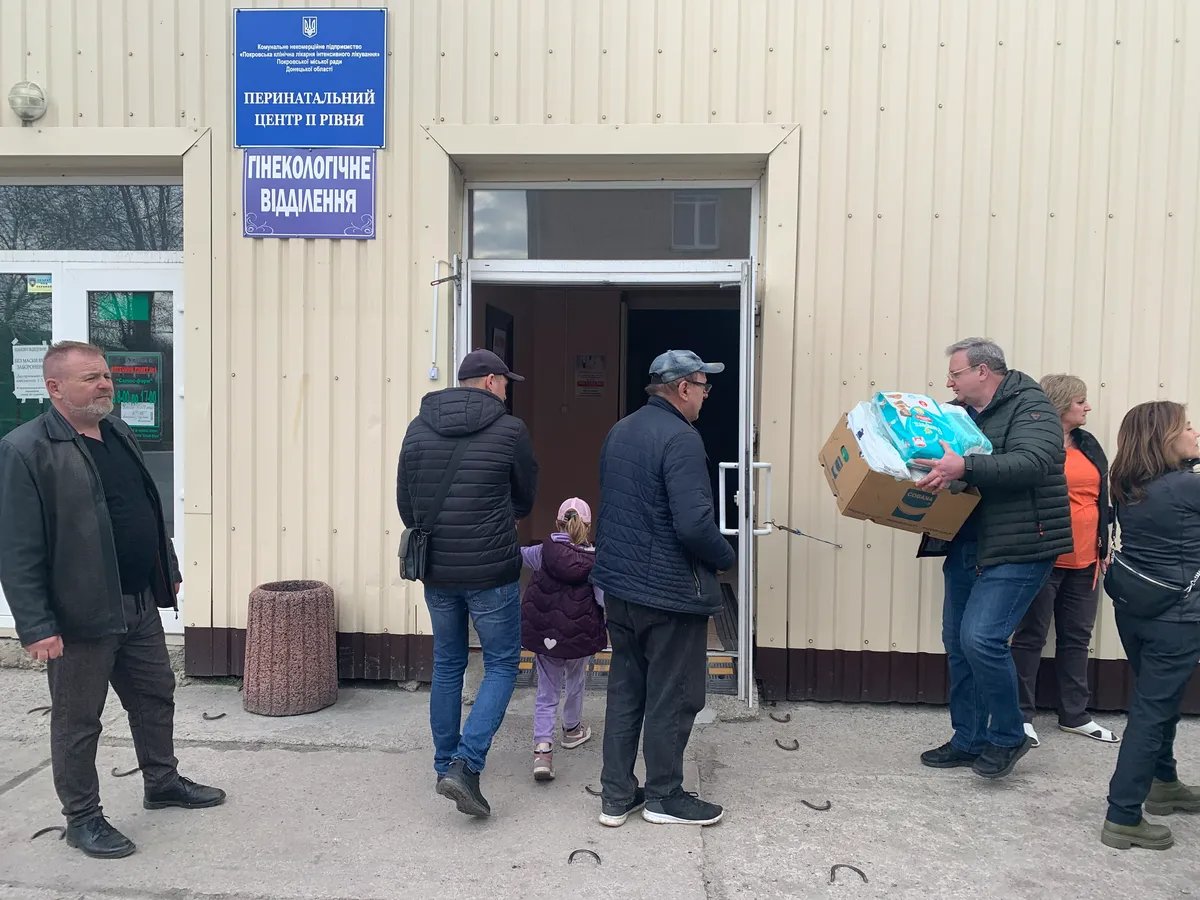
Volunteers from Kyiv unload humanitarian supplies at the Perinatal Centre in Pokrovsk (Yuri Borodin, the centre’s director general, is carrying a box with nappies). Photo: Olga Musafirova
“If there are still pregnant women and newborns here, in spite of everything we can’t abandon them and leave, can we?” Tsyganok says as if in justification. Apparently, people often hit him with that question. The other day, 80-year-old Ivan Manuilovich Kobets — an honoured citizen of the city and former head of gynaecology at the perinatal centre — was buried. Doctor Kobets didn’t evacuate either. He worked until the very end. Then three days in Intensive Care, and that was it.”
Another pause.
The Russian army is trying, methodically and in various ways, to annihilate Pokrovsk and the other settlements in the Donetsk region. They’re using Smerches and Grads with the help of aviation. Every time, especially after tragedies with casualties, regional authorities begin to plead with civilians to move to safer areas, and the government passes decrees urging and even requiring the evacuation of children from frontline areas and areas of active fighting. But Pokrovsk, when compared to Bakhmut or Avdiivka, is more or less surviving — and even growing in numbers.
On the last day of March in Avdiivka, a Russian shell killed a five-month-old baby and his grandmother, wounding the child’s parents. Several times before the attack, police officers from the White Angel rescue group had offered the family help evacuating: let us help you pack, take you by car, find you free housing in Pokrovsk… Another attempt at “negotiation” took place a day before the fatal shelling.
In a video posted by the head of the regional military administration, Pavlo Kyrylenko, a young mother almost shouts: “I already wrote a formal refusal to evacuate! I built my house brick by brick!”
“But it’s just bricks, no more than that,” the policemen wearily object. The video ends with footage of a fire blazing amidst collapsed walls without a roof.
“The boy was born in our centre,” says Tsyganok. “Lyubov Anatolievna monitored him, talked to his mother. [The mother] promised to go to Rodynske (in the Pokrovske district. — author’s note). But she lied, she went back to Avdiivka. It is a shame. We stayed to save the lives of newborns, not so that this would happen”
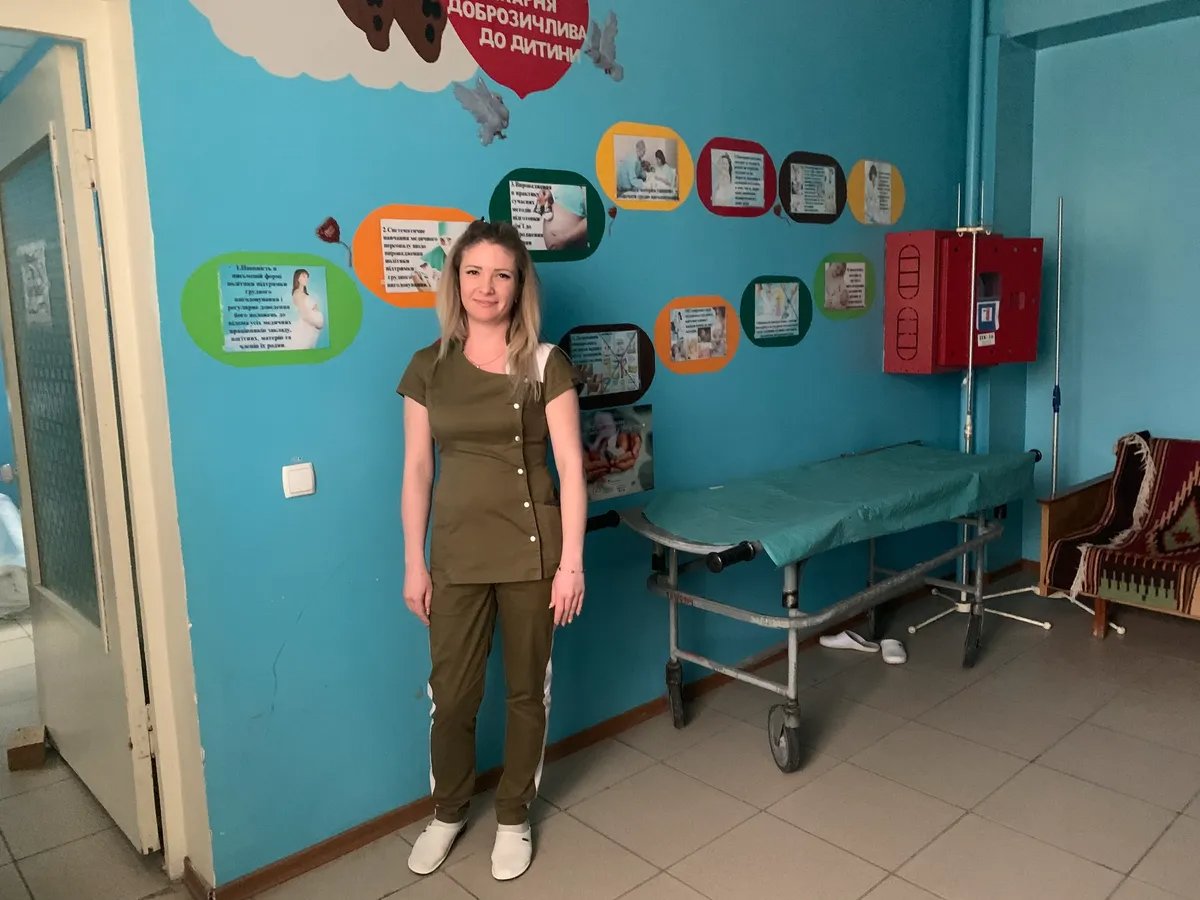
The neonatologist, Lyubov Anatolievna, came from Avdiivka. She no longer has a home. Photo: Olga Musafirova
At the exit, we meet a couple. A young husband with flowers and a visibly heavy bag escorts visitors and hugs his wife, almost carrying her. Her face is transparent and haggard: motherhood in war is an ordeal not for the weak.
In the centre, even in peaceful times, it has been customary for relatives to stay close by for care and psychological support.
“He is from Bakhmut. The commander let him come here, considering the circumstances. Maybe he’ll get some sleep,” Tsyganok says quietly.
I spend the night at the Druzhba hotel, the only one in the city that is relatively well-maintained. The air-raid siren sounds twice during the night, but no explosions are heard: Pokrovsk is lucky this time. In the Donetsk region, Russian rockets strike Kurakhove, Marinka and Krasnohorivka, and at dawn they hit the settlements of Ocheretyne and Avdiivka. Vitaly Barabash, head of the local military administration, says there are still two children in Avdiivka.. Their parents are hiding them, going from basement to basement.
The Lady with the Little Dog
I learned about Oksana from an advertisement on one of Pokrovsk’s websites.
“Please help me find a girl from your town. All I know is that her name is Ksyusha (short for Oksana — translator’s note), she’s a volunteer, short, blonde, and has a little dog Tolik,” wrote Ivan Skochko. “She helped us get out of Bakhmut, found a flat in Dnipro and paid for the first month, left money for food. Now I have found a job and want to give her back the money. I also know that before the war she had worked in a kindergarten. Ksyusha is a person with a big and kind heart. She risked her life to help people.”
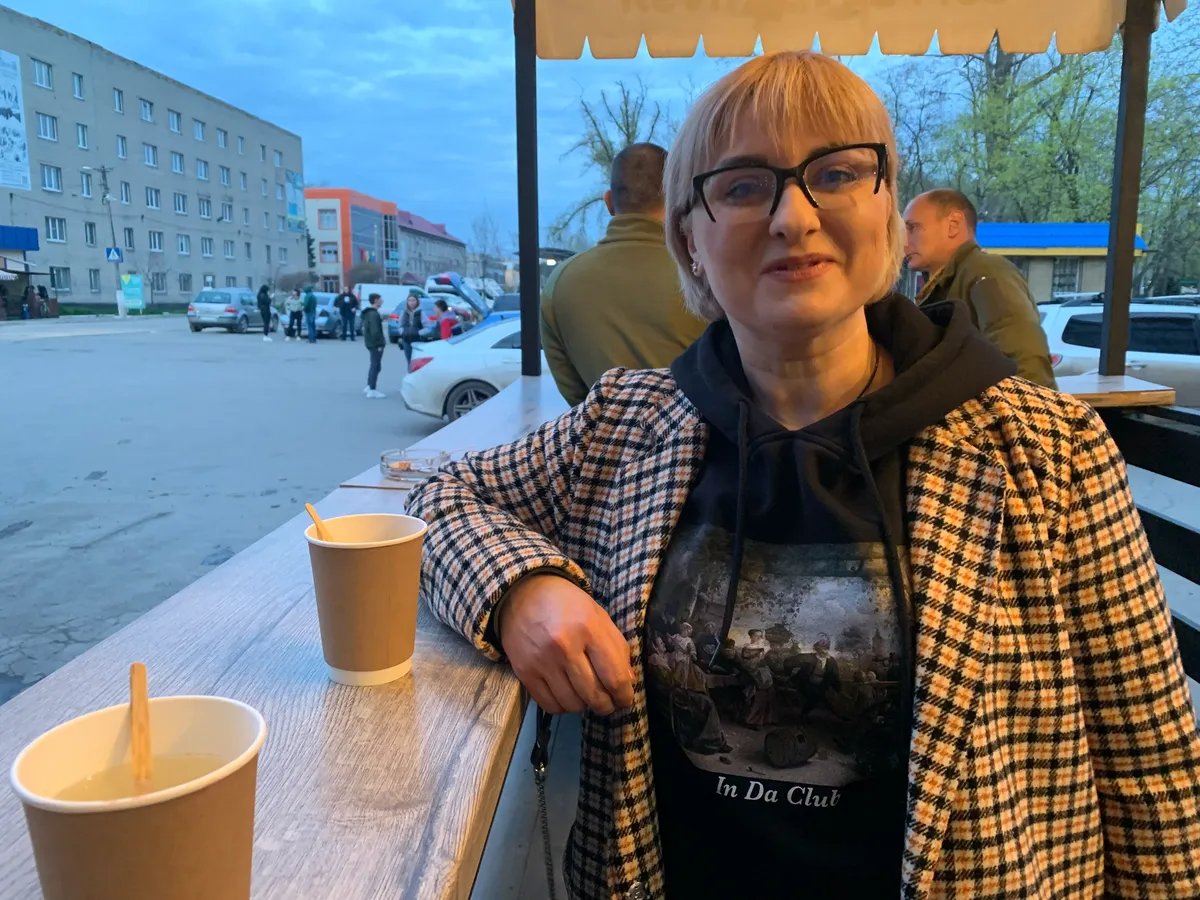
Kindergarten teacher Oksana Bakai rescued people from shelling in Volnovakha, Bakhmut and Avdiivka. Photo: Olga Musafirova
The story touched many people. The ad had more than seven hundred reposts. Eventually, the heroine, Oksana Bakai, was tracked down. She is a teacher at the Lastivka (this means “Swallow” in Ukrainian) kindergarten. After Russian missiles struck Pokrovsk, her former life was crumpled like a piece of paper, even though the war had already been going, not far away, since 2014. Oksana’s adult son went to the front. Looking like a stylish girl, his mother learned to weave camouflage nets and rescue people from under shelling.
We are walking with Oksana through the centre in the early twilight, and Tolik on a lead is following. We glance at the time. Curfew, as usual, starts at 9 PM, and there’s not a soul or a light in the streets: it’s camouflage and economising in one.
“In March last year, when they started shelling Volnovakha, we used to go back and forth by car. We drove in twos, so there would be more room for passengers… Body armour? Where would we get that from?” My companion smiles wryly, as though to an unsuccessful joke. “In the summer, a shell exploded next to the car. The passengers, thank God, had not yet been picked up, and it struck halfway down the road.”
“My ribs were broken and my partner, a retired miner, was badly wounded by shrapnel. The military took me to Kurakhove, bandaged me up and then took me to the Mechnikov Hospital in Dnipro,” she says.
“My son and his brothers from the Ukrainian Armed Forces paid for my so-called transport expenses, their salary allowed it.”
Since 24 February, Bakai has not spoken a word of Russian, as a matter of principle. Sometimes acquaintances have even criticised her: what kind of nationalism is this, you are not at work or on the podium now!
We reach the building, of which only the skeleton remains: a typical Soviet-era cinema, now with gaping windows.
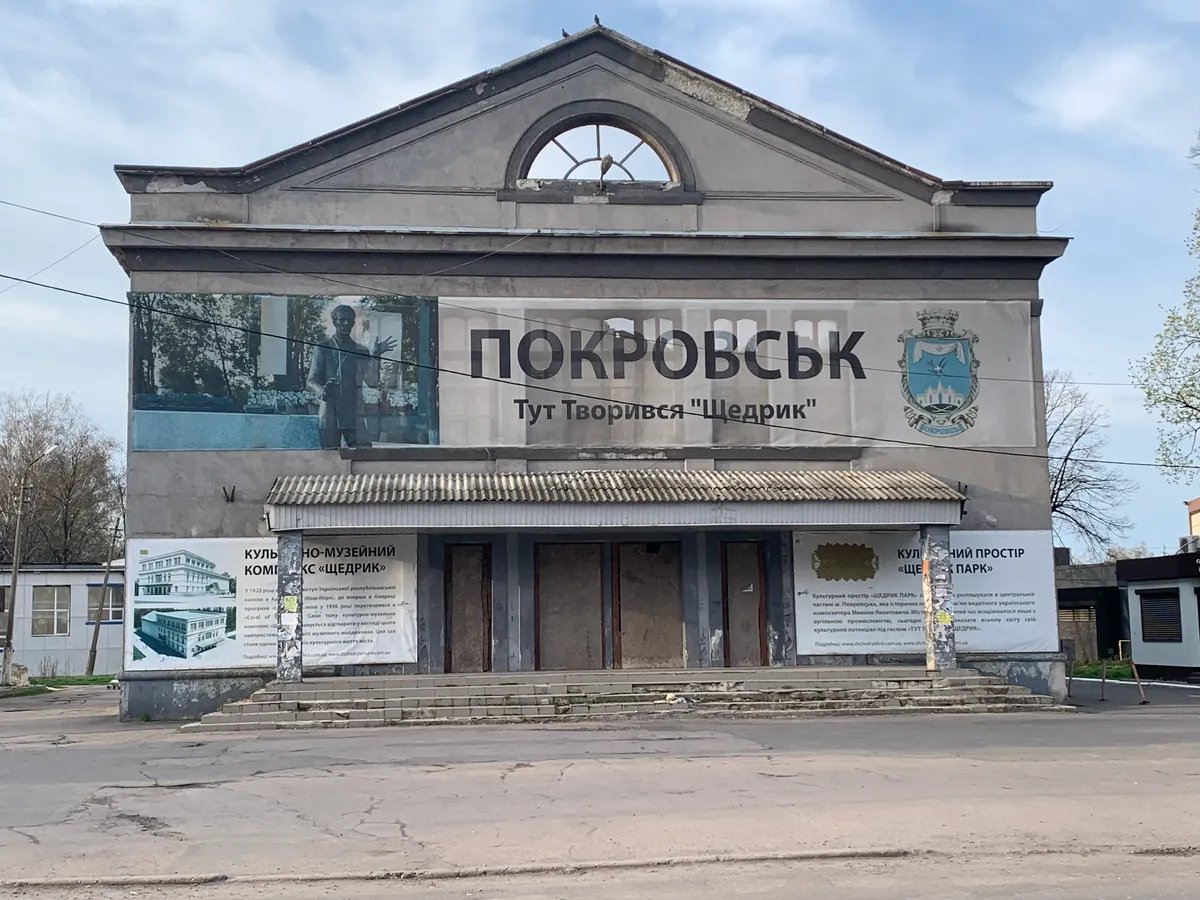
The cinema in Pokrovsk has fallen victim not to bombing but to redistribution of communal property. Photo: Olga Musafirova
“Hit by artillery?”
“No, a fire. Several years ago. The officials were viciously dividing up all the communal property.”
In Bakhmut, many have memorised Bakai’s phone number instead of the number for emergency services. She managed to evacuate Ivan Skochko, with his wife and their three children, a week before the city was closed to volunteer flights: too dangerous. Some friends from Odesa, realising that it was useless to dissuade her, gave the intrepid “lady with the little dog” a minibus.
“Eighteen people signed up for the ride, twenty-six came. ‘Dear friends,’ I said, apologising, ‘we won’t be able to take everyone. There are bags, pets…’ And there’s a rumble all around! We had to make two trips,” Oksana recalls. “Ivan’s children, especially the younger one, a three-year-old, looked exhausted. I left them all at home for the night, and in the morning, I drove them to Dnipro. We found them a flat at once and got food. Children have to eat, don’t they?”
The volunteer herself doesn’t intend to leave the city: she believes in the Ukrainian army. She says there are not enough mothers like her in Pokrovsk.
According to Serhii Dobryak, head of the local military administration, there are almost five thousand children “from ages zero to eighteen” in the city. People give various reasons for not leaving, but the most common is still the attachment to their “own walls”. And in the past two months, more than six thousand people have been displaced from even hotter spots in the Donetsk region.
“Wow, and everyone rents accommodation in Pokrovsk?”
“There is a new phenomenon — resettlement tourism,” admits Dobryak. “People register to receive entitlements and other things. And then they migrate.”
In other words, they return at their own risk to places where they no longer exist statistically.”
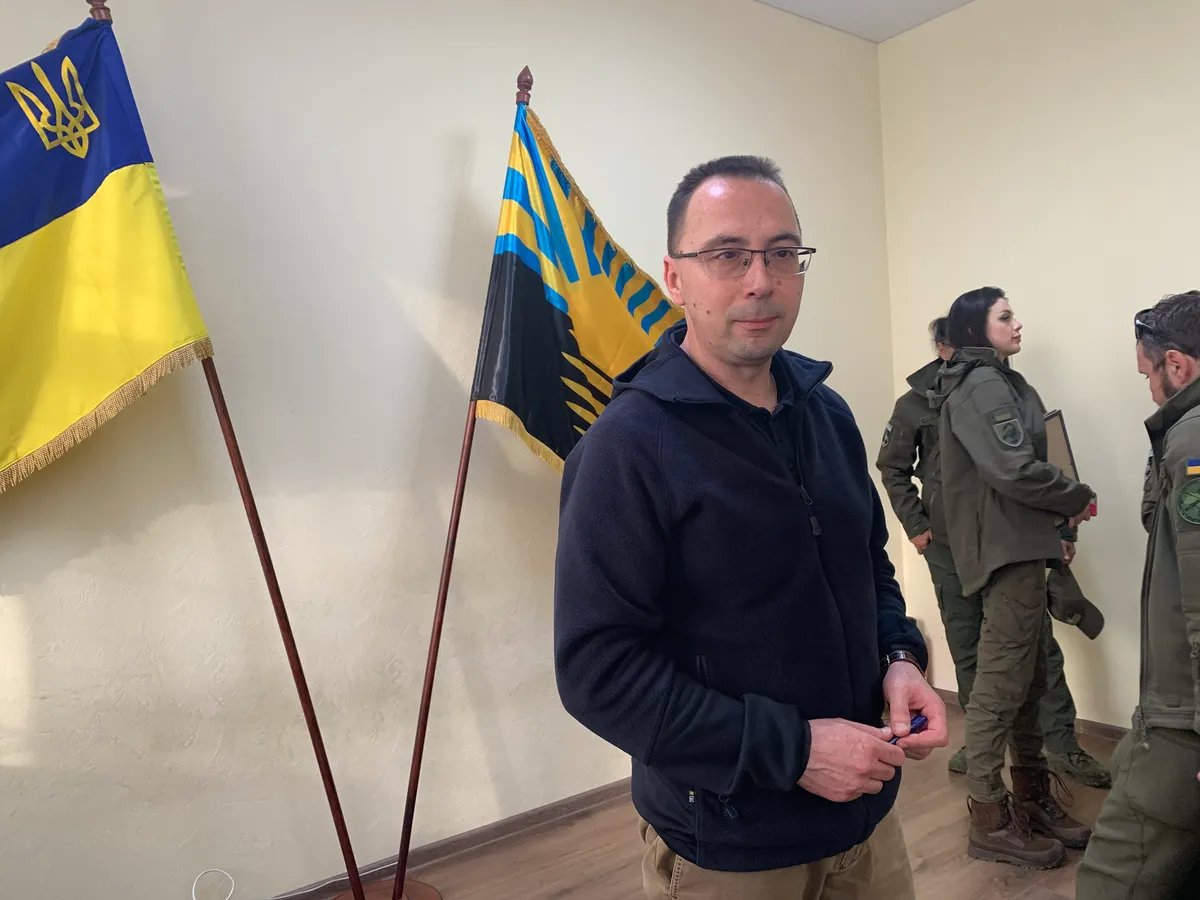
Serhii Dobryak, Head of the military administration of Pokrovsk. Photo: Olga Musafirova
From desperation to trade
It is eighteen kilometres from Kurakhove to Marinka (which the Russians continue to shell, although it seems that there isn’t anything left to destroy). It is thirty kilometres to Vuhledar, where the fighting continues unabated.
The road to Kurakhove is empty. If a car is occasionally seen, it is either a spotted-green jeep or a fuelling truck, for which every crater here is familiar. There are no more motivating advertisements — “Turn your anger into a weapon!” — no billboards with portraits of fallen soldiers, or roadside signs warning “Don’t pull over!” with pictures of mines on the side of the road. But it is not the battered, overturned carcass of a lorry on the roadside that amazes you; it is the fields where the wheat has sprouted: how, when did they manage to sow it?
Just outside the village of Tsukurino, renowned for its mines and railway junction, I spot a kind of triptych about the war. The mansion at the far end of the row has been damaged by a direct hit. On the neighbouring one, with a beaten-up roof, there’s an irrelevant notice: “House for Sale”. The third owner, desperate, simply abandoned the place. But as a farewell, he wrote on the gate: “Die! Die!” To whom was the curse addressed? Further on, beyond the white-pink wall of blossoming apricot trees, there is a panorama of the Kurakhovske Reservoir, a former resort.
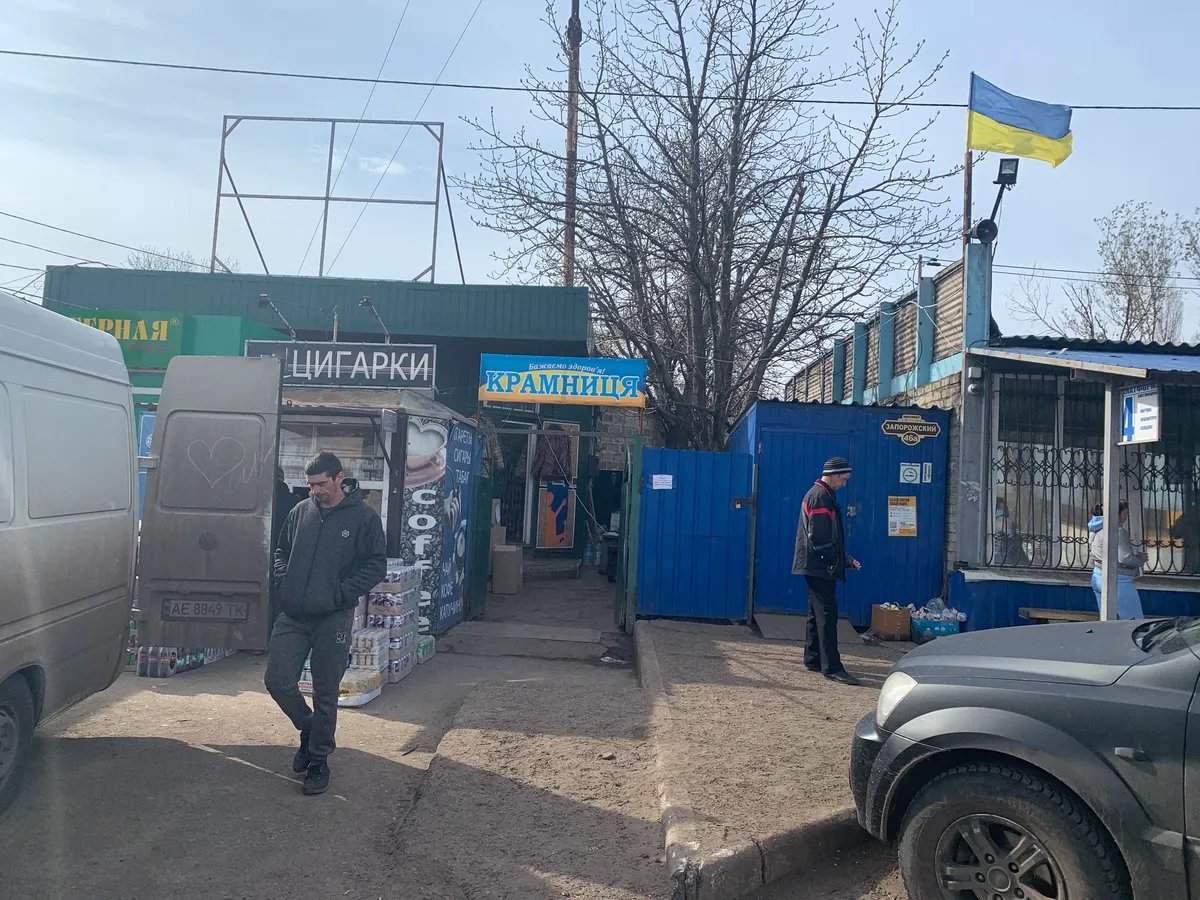
The Kurakhove market has been shelled more than once with casualties. Photo: Olga Musafirova
Cannonade can be clearly heard. The Ukrainian military is warning us:
“Hey, volunteers, don’t bunch up! ‘Orlan’ is coming!” (Russian drone with strike modification which has been actively used since May 2022. — author’s note).
You can see from the rows of market stalls: small businesses are trying to survive somehow, mostly at the expense of the military. A state flag is flying above the tent “trade centre”. On the counters are rubber boots, car tyres, tools for repair, canisters with diesel fuel… People are selling what remains in their garages — anything that’s in demand and has a price.
On the fence, in a prominent place, there are advertisements for washing clothes.
The laundry service is for the soldiers who come here for a short respite from the front line. The soldiers have money. Quick romances with local women are also in demand.
There’s also an official, QR-coded poster hanging: free evacuation, phone number for an appointment. There are “smoking area” signs above the trash bins, also in English. It is remarkable that people smoke in designated smoking areas.
Just around the corner, the consequences of the artillery hit are striking. Only the signboard remains from the shop — “Tea. Coffee. Sweets. Chocolate. Biscuits.” The inside is black. A wreath of artificial flowers was attached to one of the surviving pillars. To my cautious “Has something happened there?” a woman sitting nearby over crates of homemade preserves and bread loaves, looks irritably at my “Press” badge:
“Something happens here all the time, didn’t you know? They’re a pain in the arse! Well, a shell hit in December. A salesgirl was blown up, others were killed by shrapnel.”
She says that she used to work at the Kurakhovske TPP, but when the Russians started to hit the plant with rockets at the start of the heating season and there were wounded people, she quit:
“I’d rather live!”
It seems that it was an exaggeration to say she “quit”. The city-forming enterprise, the only one that can hold on and pay money, is a structural subdivision of DTEK, the largest energy company owned by Rinat Akhmetov. People do not usually leave on their own. The plant survived the heating season, although it suspended operations several times — most recently after shelling on 2 April.
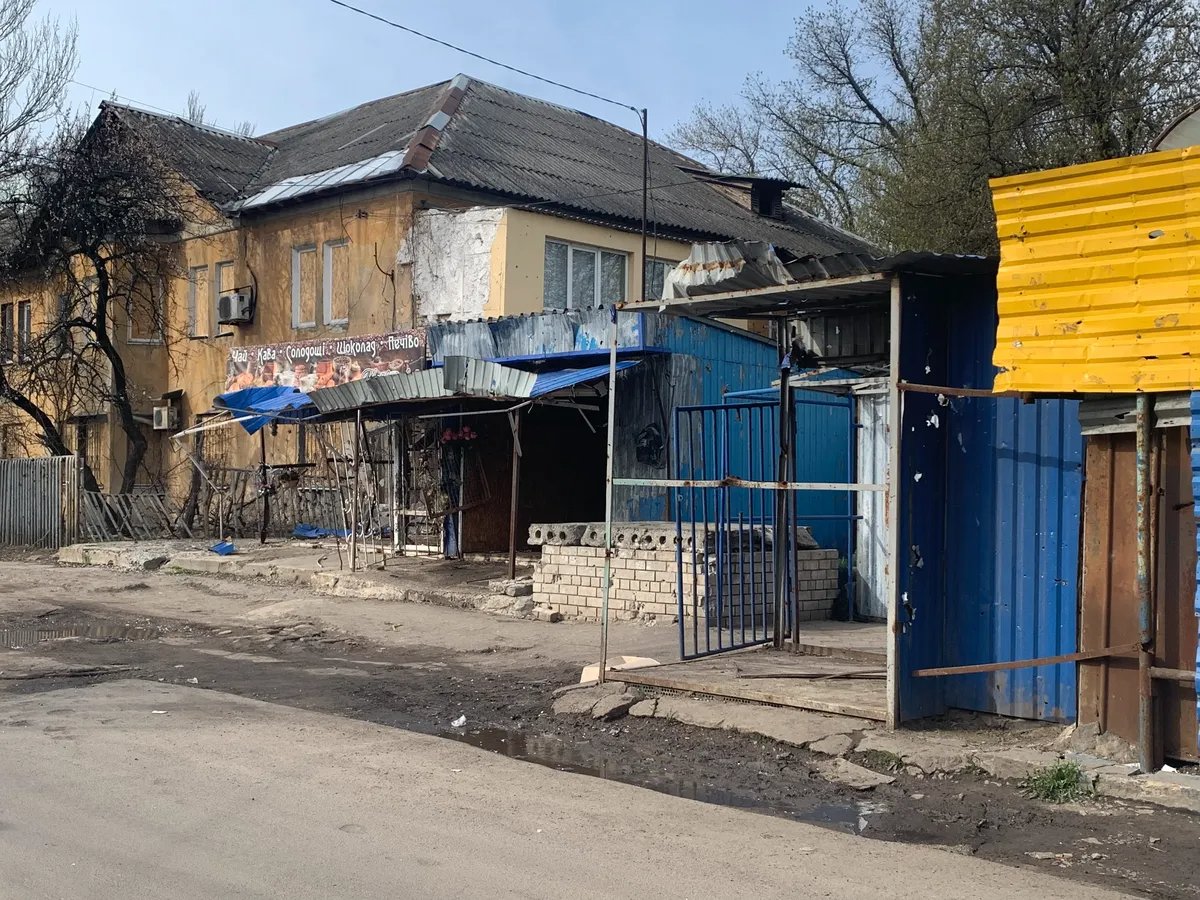
Kurakhove. Photo: Olga Musafirova
The amount of shelling in Kurakhove can’t be counted. People claim: “There are strikes every day!” Last September, an S-300 missile destroyed the wing of a school building. Fortunately, the children were not in class. The aftershock damaged nearby multi-storey buildings. In early winter, the Russians used multiple rocket launchers to attack the city centre, the local market, a grain elevator, a petrol station and an apartment building. Fires broke out everywhere. Ten dead, several dozen injured.
The Russians celebrated the beginning of April just as well: the Uragan rockets hit a hospital (an infectious disease ward), a police station, a shopping complex and a post office.
Patching holes in houses became a routine process. The morning after a shelling, the survivors simply go to the military administration and get slate, planks, plywood, and film for the windows. About half the population, twenty-one thousand people, including families with children, remain in the city.
Can’t do without filtering
Somewhere near Kurakhove, where the sound of shelling is even louder, we meet up with members of the military. We’ve brought them food and various necessary supplies. The fighters boast that the tap in the “abandoned” house has boiling water; you can wash dishes and do your laundry. The Kurakhovske TPP is a beauty! But there is no cold water at all.
Hennadiy, a 55-year-old Kyiv resident, a historian by training and veteran of the ATO (the operation in Donbas in 2014-2018 — translator’s note), who volunteered to go to the front at the start of the full-scale war, makes Lavazza coffee for his guests on a gas burner and discusses his private attempts to communicate with the local population. He talks about a local man who accused Ukrainians of shooting up the area.
“…He stands there indignant in our direction: ‘You bastards, what are you doing, shooting up the town!’ I called the SBU, and they ‘took him in’. I’m a military man, I can’t, though I wanted to kill him a bit. After all that to think that we were firing at ourselves, attacking ourselves? They said the same thing in the fourteenth and fifteenth: “If it were not for you Ukrops, our Russian brothers would not have hurt Donbas. Surrender, stay alive!”.
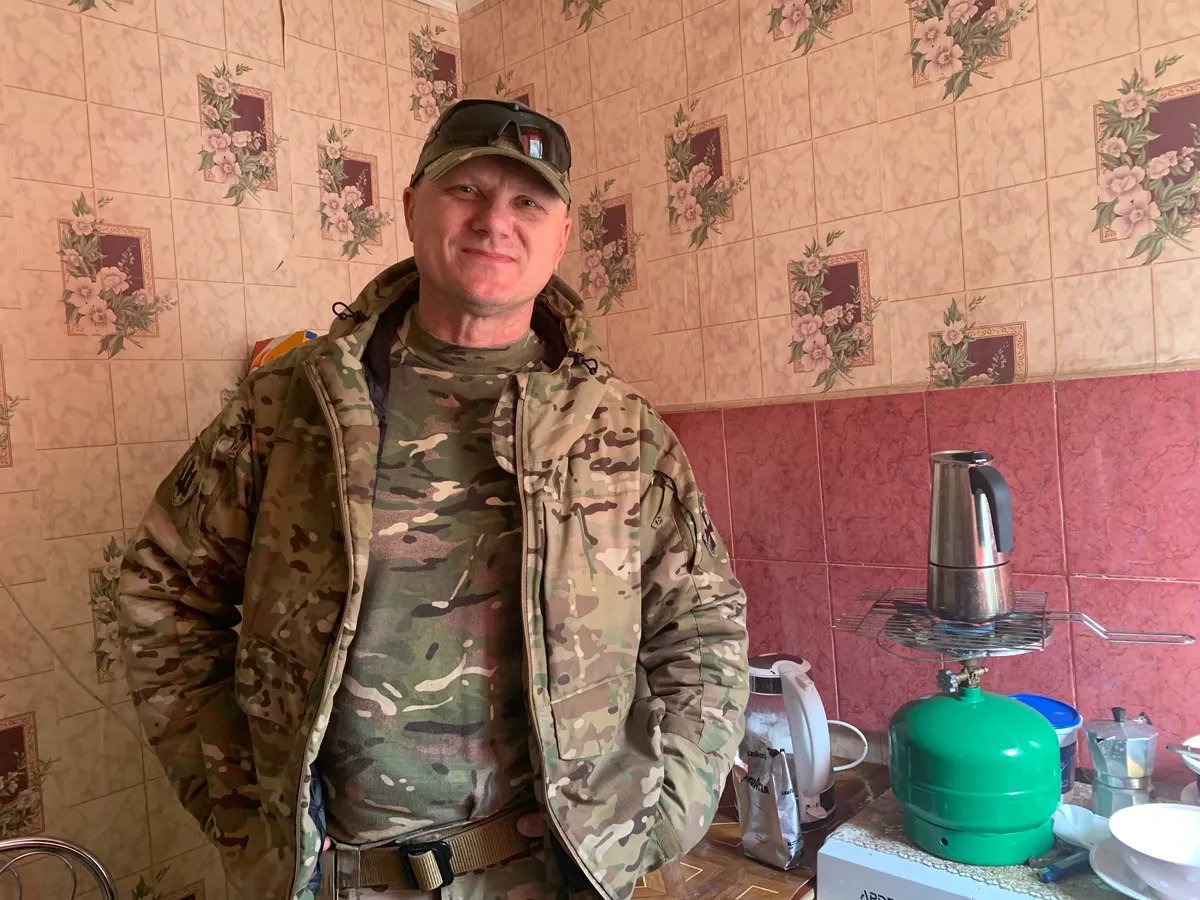
Ukrainian military man Hennadiy. Photo: Olga Musafirova
“So the consciousness doesn’t change? The rear is unreliable…”
“In my opinion, the state cannot survive without [population] filtering. After the victory, citizenship should be granted only to those who pass exams: knowledge of history, knowledge of the Ukrainian language and the basics of the Constitution.”
The coffee is boiling. Hennadiy, on the other hand, cools down and clarifies his statements somewhat.
“In comparison with 2014-2015, sure, there is a change in sentiment. About 30 percent are like I have said, but 70 percent have headed in a positive direction. For example, in the streets of Kurakhove I hear middle-aged people speaking Ukrainian; this was not the case before. Young people are beginning to understand what we are fighting for, and why the world is helping Ukraine.
“It is hard for us now, but it is different,” concludes Hennadiy. “We’re waiting for the counter-offensive. The fellow lads, who have been preparing for a long time, write: ‘We’ll come soon, hang on a little longer!’ That ‘soon’ keeps getting delayed, but we are holding on.”
Pokrovsk — Kurakhove, Donetsk region
Join us in rebuilding Novaya Gazeta Europe
The Russian government has banned independent media. We were forced to leave our country in order to keep doing our job, telling our readers about what is going on Russia, Ukraine and Europe.
We will continue fighting against warfare and dictatorship. We believe that freedom of speech is the most efficient antidote against tyranny. Support us financially to help us fight for peace and freedom.
By clicking the Support button, you agree to the processing of your personal data.
To cancel a regular donation, please write to [email protected]
